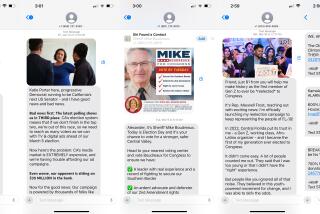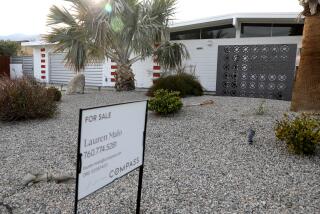Computer-Driven Sales Pitches : Up to Their Ears in Junk, Phone and Fax Users Say
- Share via
WASHINGTON — It hits the switchboard at the small Colorado hospital like machine gun fire. All eight lines on operator Betsy Joyce’s panel light up.
“Hello. Would you please listen to the following important message,” the disembodied voice says as she answers the first line, then the second and the third . . . every line is the same.
Then the sequence is repeated in the hospital’s wards. One after another, a computer dials phone numbers sequentially, hitting patient rooms, then attacking obstetrics, orthopedics, pediatrics and physicians’ offices. Nurses scramble down halls trying to answer the calls before a patient jerks out his IV tether or sends a heart monitor crashing.
The periodic sieges at Penrose Community Hospital, an 88-bed facility in Colorado Springs, happen every month or so and last for hours, sometimes for several days in a row. The recorded ads relentlessly pitch various local businesses, including a nearby liquor store.
“They’re awful,” Joyce said. “You can’t even argue with it. I’ve listened through to the end several times and said (at the beep): ‘You’re calling a hospital’ but that doesn’t make any difference. . . . There’s nothing I can do. I have to answer them. You don’t dare not answer.”
Before long, Congress may be answering, too, as complaints pour in from hospitals like Penrose, other emergency services, ordinary businesses and just plain citizens who are tired of having their phones--and increasingly their fax machines--ringing like fire alarms with unsolicited sales pitches.
A House committee is expected to vote next month on legislation to restrict “junk calls” and “junk fax.” Dozens of states, including California, either recently have enacted such laws or are considering doing so.
The surging popularity of auto-dialers and fax machines has created a technology-spawned confrontation between retailers who use the increasingly efficient--and intrusive--marketing devices and those on the receiving end of the line.
“It’s an ‘80s problem,” said Steven S. Seltzer, president of Modern Communications in Pennsylvania.
Since the beginning of the year, Seltzer said, a hospital beeper system in western Pennsylvania has been tied up at least a half dozen times by an auto-dialing computer.
“In the case of a transplant candidate, that can be critical,” he said. “They get a beep, and they think they’re going to the hospital, but it’s a telemarketer trying to play a message. Hospitals can’t reach doctors. Life hangs in the balance.”
But businesses that use auto-dialers and fax machines to market their goods and services say that the burgeoning backlash threatens their First Amendment rights. They argue that a few bad operators are soiling the whole industry.
Consumers, on the other hand, complain that their right to be left alone is rapidly disappearing.
“There’s a growing level of anger about this,” said Chris DePhillips, a legislative assistant to Rep. Marge Roukema (R-N.J.), a co-sponsor of the House bill. Approved by a subcommittee in July, the measure will be taken up by the House Energy and Commerce Committee after Congress returns from its recess in September.
The bill would require the Federal Communications Commission to establish standards for automatic dialing systems and fax machines. Calls to hospitals, police stations and other emergency services would be illegal. A national directory would be compiled listing people who have indicated, perhaps by just checking a box on their phone bills, that they don’t want to receive unsolicited calls or faxes. Violators would be subject to fines of up to $10,000 and jail terms of up to a year.
Similar bills are working their way through the California Legislature. One would forbid telephone companies from selling unlisted numbers to telemarketers. Another would require a telemarketer to ask permission before playing a recorded message. A third would limit unsolicited faxing between the hours of 8 p.m. and 8 a.m. and mandate that all telefaxed messages display a toll-free number that could be called to halt future transmissions.
Not Far Enough
None of these measures goes far enough to satisfy some critics.
“Whether it’s junk fax or junk phone calls . . . we have an absolute right to be left alone,” said Bob Bulmash, president of Private Citizen, a Chicago-based consumer group. “Our right to be left alone is being sapped by technology. Our last sanctuary, our home, should be inviolable.”
Bulmash said he recently received a letter of support from an 87-year-old woman with arthritis, multiple sclerosis and a heart condition who finds it difficult to get to the phone. The woman has an unlisted number, Bulmash said, but even that can’t shield her from computer-driven sales calls.
New York consultant Geri Gantman, however, said that the telemarketing industry, which generates an estimated $42 billion annually and supports 1.5 million marketers with computer-assisted dialing systems, has been taking a bad rap.
First, she said, only about one fourth of telemarketing activities involve unsolicited calls to people in their homes. And fewer than 1% of those calls are made by computers alone, Gantman said, with mostly local companies using the random auto-dialers.
Richard A. Barton, a vice president of the Direct Marketing Assn., calls random dialing “a very poor marketing technique.”
“I’m always surprised it gets any response,” Barton said.
He said that much of the trouble is caused by fly-by-night firms that indiscriminately use random dialing, the kind of unscrupulous operators who are likely to ignore restrictive legislation or fall by the wayside before they can be prosecuted.
State Restrictions
The Colorado Springs hospital may be a case in point. The state already has moved to restrict auto-dialing. Switchboard operator Joyce said that some of the messages start by saying: “We notice you’re in our neighborhood,” before touting a local retailer.
Barton said that most telemarketers are more circumspect. “I don’t think you have a problem with the big national companies,” he said, “other than that people don’t like to get phone calls.”
Gantman agreed.
“One of the misconceptions is that telemarketers don’t want to know who doesn’t want to be called,” Gantman said. “We do want to know; it makes everyone happier.”
To that end, the DMA publishes a quarterly list of about 230,000 people who have written to the association asking not to be called.
Still, she said, “We can’t promise they’ll get no calls at home.”
The controversy over the unsolicited use of fax machines is just as vexing, although it does not affect as many people.
In May, the president of an Orange County business that sells fax paper decided to lobby the governor of Maryland, who was considering signing one of the nation’s first bills to ban junk fax.
Steve Ridinger, who advertises by sending facsimile transmissions to more than 500,000 fax users nationwide, sent messages to about 1,200 Maryland businesses, asking them to tear off the bottom half, sign it and then fax the form to Gov. William Donald Schaefer in Annapolis.
One morning, hundreds of faxes spewed forth from the governor’s fax machine, choking off virtually all other transmissions for six hours. The effort certainly was convincing: it persuaded the governor to sign the bill. The measure, which took effect July 1, subjects “fax abusers” to $200 fines.
“It was an incredibly counterproductive lobbying effort,” noted David Iannucci, the governor’s chief legislative officer, who said that the governor had not paid much attention to the bill until that morning. “It demonstrated to us the problems that businesses are facing.”
But Iannucci said that the message was underscored by the fact that about 20% of the faxes had been altered to indicate support for the bill instead of opposition. On some of the forms, the message “don’t sign this bill” had been crossed out and changed to “do,” he said.
One signer, Iannucci recalled, added a postscript that said, in effect: This is bunk. Sign the bill. Stop these guys from using my fax machine as their printing press. The actual language was not quite so polite.
“I’ve never seen that on a mass mailing before. Usually, if people disagree with a solicitation, they throw it in the trash,” he said. “These people were so bothered that they took the time to change it.”
Enough people are bothered by junk fax that more than 20 states are considering legislation tougher than the proposed federal law.
But “free faxers” contend that junk fax is a nonproblem, that some of the proposed restrictions would hamper routine business practices, that imposing a $1,000 fine for a 3-cent fax transmission is ludicrous and that their free speech rights are in danger.
With technology developed in the 1970s but not widely used until the early 1980s, fax machines have exploded in popularity and are now standard office equipment. Industry observers estimate that by 1991, more than 5 million fax machines will be transmitting more than 60 billion pages a year in the United States alone.
“The opportunity to abuse it will only worsen,” Rep. Christopher Shays (R-Conn.) told a House subcommittee in May. (The congressman’s comments were later faxed to The Times.)
“Not only do they get junk mail, but the postage is due, too,” said congressional aide Mike Connolly, noting that the receiver pays several cents for each sheet of fax paper.
Frequent faxers are understandably nervous. “I have a pro-fax statement I could fax you if you request it,” said Heather Bante, vice president of Public FAX Inc., an Orange County firm that publishes a directory of fax numbers. “However, I won’t fax it to you unsolicited.”
Bante worries that the rising tide of anti-fax sentiment “risks infringing on some of our basic constitutional freedoms.” And just because a fax transmission is unsolicited, Bante said, “doesn’t mean it’s unwanted.”
“The last thing we want to do is to send material to people who don’t want it,” said Elliott Segal, a vice president at Mr. Fax in Irvine, the firm behind the Maryland lobbying effort and similar attempts to influence legislation in other states, including California.
If the ill-fated lobbying attempts proved nothing else, he said, they showed that businesses are concerned.
“They don’t want to see legislation that tells them what is or is not an opportunity to them,” Segal said. “One man’s junk is another man’s opportunity.”
More to Read
Sign up for Essential California
The most important California stories and recommendations in your inbox every morning.
You may occasionally receive promotional content from the Los Angeles Times.










